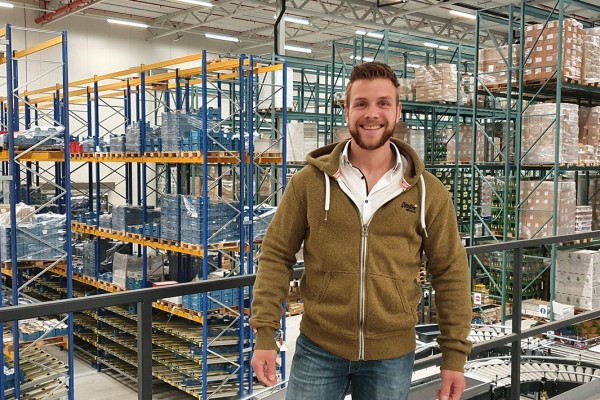What does a logistics engineer do?
As a logistics manager, you ensure that everything runs smoothly behind the scenes. You manage teams and logistics partners, analyse data, and come up with smart improvements. This makes the entire logistics process more efficient and ensures that customers receive the right products on time.
Watch this video for an impression of your career options after graduation.
Take a look at the Logistics Engineering job profiles
Logistics Engineering Alumni

The trick is to make it feel less like work.
In 2018, he graduated in Logistics Engineering. He poured his heart and soul into his work, and suddenly it was over. Tom talks about rosy clouds, discovering what really suits you while working, and the renewed energy that came with it.

Logistics Engineering and a fairy tale
‘Now get to work and make your own fairy tale happen!’ Daphne was told after her placement at the Efteling theme park. And that is exactly what she did. In addition to her job at a large international logistics company, she is now also a wedding planner.
Choose Logistics Engineering at BUas
You will learn how to use IT and data to ensure that people, goods, and services arrive at the right place quickly, safely, and sustainably. Are you enthusiastic about technology and innovations, and do you want to make an impact in the Netherlands or worldwide? Then Logistics Engineering may be for you.
A master’s after Logistics Engineering
After obtaining your bachelor's degree in Logistics Engineering, you have the option of pursuing a master's degree at BUas or another university of applied sciences to further specialise.
Frequently asked questions about Logistics Engineering
If your question is not listed below, feel free to ask in the chat. Our students will be happy to help!
- What do you do in the Logistics Engineering programme?
The Logistics Engineering bachelor’s programme teaches you how to make logistics processes smarter, more digital, and more sustainable. This programme is ideal if you are interested in technology, data analysis, and the smart organisation of processes within companies. You will develop skills to analyse and improve logistics systems. This includes the use of automation, robotisationm and data analysis to optimise processes within production and distribution. You will learn to work with software tools to solve logistics issues.
- Within which sectors can you work with a degree in Logistics Engineering?
After completing your bachelor's degree in Logistics Engineering, you can work in many different sectors. These include production, e-commerce, distribution and defence. The logistics sector is broad and rapidly evolving, which means that there is a high demand for well-trained logistics professionals. This means that this programme gives you a strong chance of landing a job quickly. As a graduate, you will usually start in a well-paid junior position and from there you can progress to a management position.
- What are my prospects of finding a job after Logistics Engineering?
Around 90% of graduates find a job at a bachelor's level, of which 80% find a job in the field of Logistics Engineering.
- How much will I earn?
Graduates earn an average gross monthly salary of around €2,961, based on a 39-hour working week (Source: Studiekeuze123).
